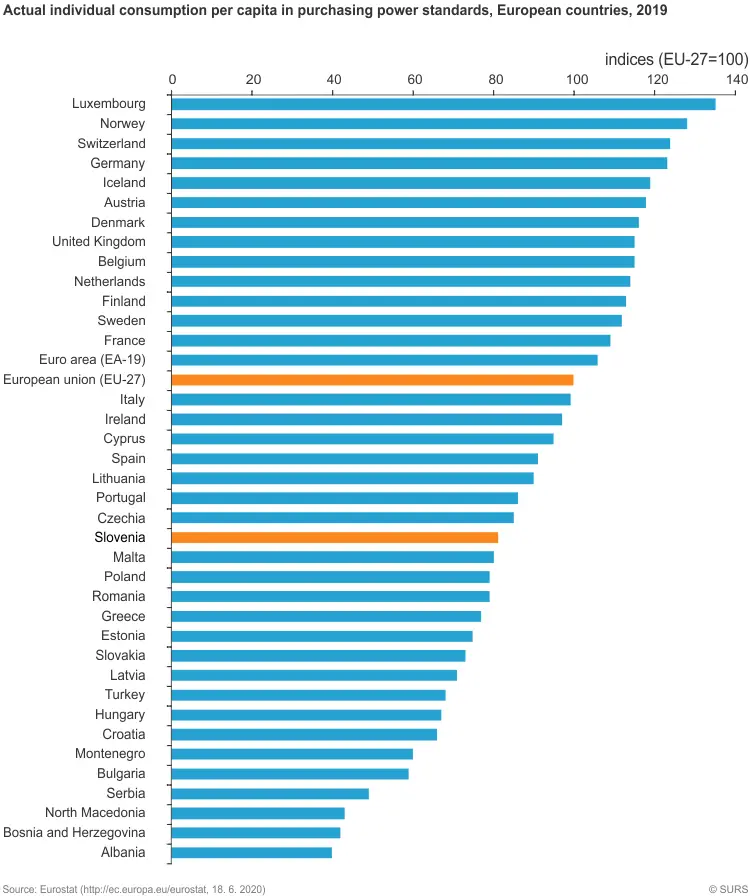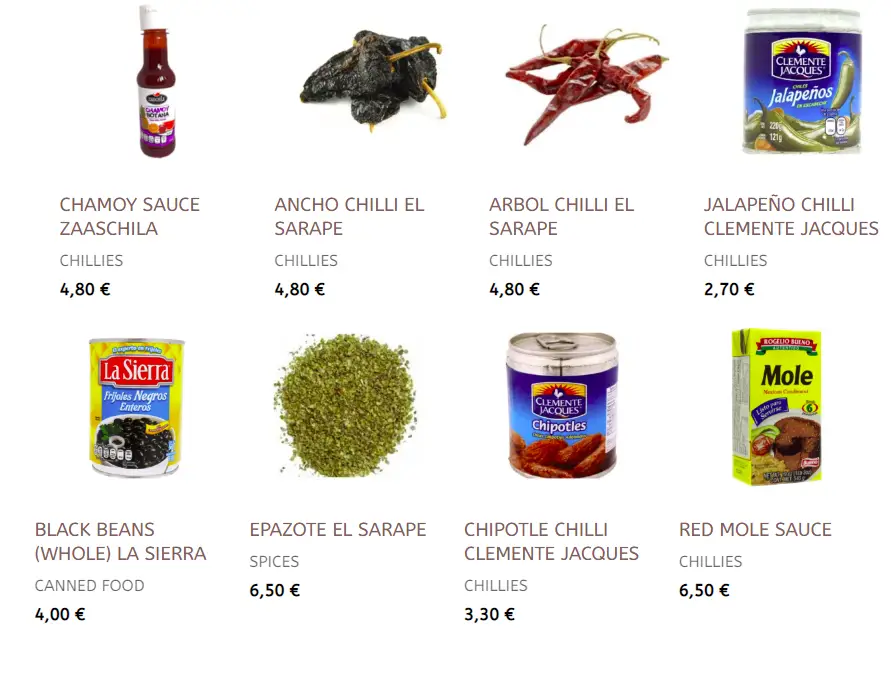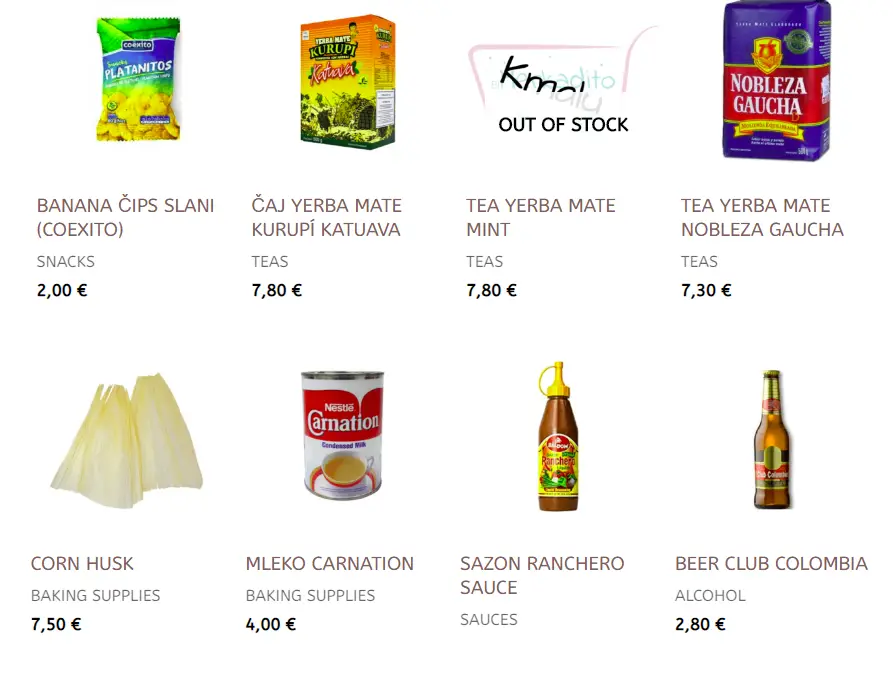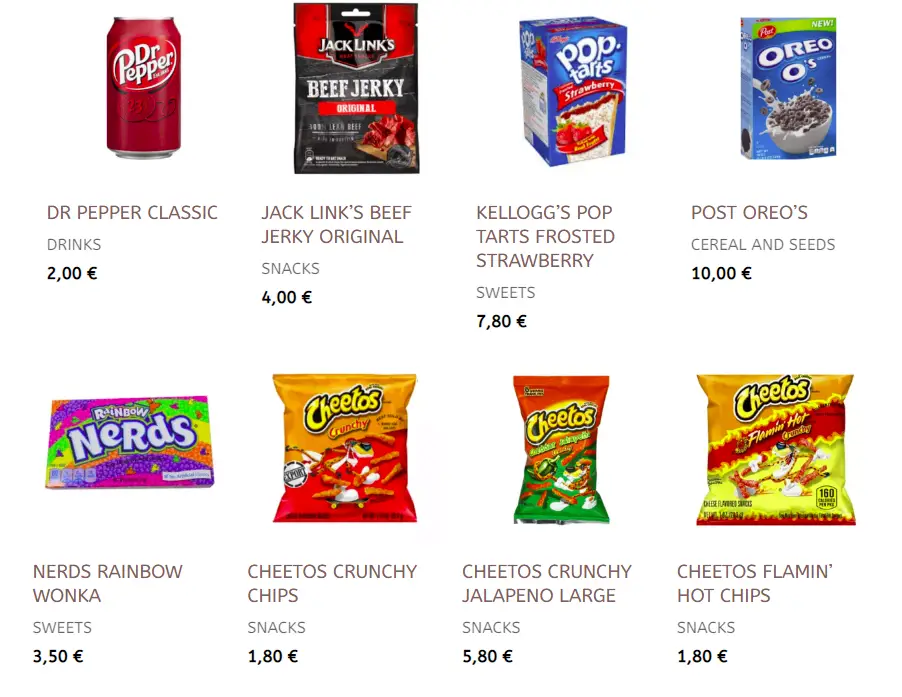Business
A new online store opened last week, El Merkadito, offering a growing range of products from the Americas, the kind of things you just can’t find in Mercator or Spa. Always interested in the exotic, delicious, and spicy we got in touch with the found, Patricia Castillo (now Patricia Grm) from Veracruz, Mexico, to find out more…
How did you come to be in Slovenia?
In 2006, I started a relationship with a Slovenian guy who then became my husband in 2009. I moved to Slovenia in 2008, when I was 20 years old, and the next year we got married. So now I’ve been here for almost 12 years and totally love the country, its people and food. That said, I still miss Mexico, and the kind of food I could eat there, which is how I got the idea for the store.

What were you doing before this?
I’ve worked as a Spanish and English teacher for many years. Back in 2018, I became interested in remote work, and since then I’ve been working that way. Sometimes as a translator, customer support, social media assistant, and now I finally accomplished what I’ve desired for quite a long time, to have my own online shop.
Why now?
With the lockdown everyone was doing more shopping online, and that’s when I noticed the lack of options for online food and drinks in Slovenia. Even local things, let alone foreign brands or products. Also, a great way to experience a country, especially when you can’t visit it, like now, is by trying the real, authentic food. So this seems like a great time to bring some of the America’s to Slovenia
Also, for myself, every time I go back to my lovely Mexico or Panama, where my father lives, I just want to eat the food and products you can easily find there non- stop. Maybe this is just nostalgia, but in Slovenia I often miss the things I grew up with, so I thought why not bring them here? I’m also convinced many Slovenians are interested in trying new flavors and dishes.
What are some of the products people can find on El Merkadito?.
We have Mexican products such as dried chilies, spicy sauces, spicy candies, chocolate with cinnamon, beans, sweets, beer, and so on, while from the US, we have different brands like Jack Link's, Dr. Pepper, Hershey's, Kellog's, Reeses, M&M's, Cheetos, and more.
You can also find products from Latin American, like Yerba mate tea, pre-cooked white or yellow corn flour, and beer.
Since we’re a small, new company, and in the spirit of solidarity with other small businesses in Slovenia and Europe, we also decided to offer some European products. Supporting each other is a good and healthy way to collaborate with other businesses, and we practice fair trade with the producers to keep this attitude in all aspects of our work.
What’s next?
I don’t know, since these are early days, but I'm really excited about this new adventure. I believe expats, especially from the Americas, will be happy to have some things at home that remind them of their childhood or good memories from where they are from. I'm also sure Slovenians are going to be curious about this, and once they try some of the interesting, delicious and hard to find products El Merkadito offers, we’ll become part of their "I love you list".
Check out the store now to see what you’d like to try, and follow on Facebook to find out when new products are added, with 15% off on your first order in July.
STA, 1 July 2020 - The Slovenian telecoms equipment maker Iskratel, which has been looking for a strategic partner for a while, has been acquired by the Austrian group S&T. The deal, worth EUR 37.5 million, is expected to be finalised in the autumn as it awaits regulatory approval.
The S&T group, a global IT consulting, solutions and services provider based in Linz, signed the contract to take over the outright stake in the Kranj-based group on Tuesday, Iskratel has announced.
The Iskratel group, which last year generated EUR 115 million in revenue, has been guaranteed to be able to keep its identity and brand as part of the S&T group.
The release adds that variable purchase prices had also been agreed depending on profit developments in the next three years.
The companies recognise numerous synergies with the takeover, in particular in the development of 5G networks, solutions for industry 4.0, digital transformation of industry verticals and next-generation optical broadband networks.
Opportunities are also seen in the strengthening of the sales network in the Adriatic and Eastern Europe regions, and expansion to the Western European markets.
The takeover concludes a year-long search for a strategic partner which, according to Iskratel, will "enable further growth and development and implementation of the long-term business strategy."
Željko Puljić, the CEO of the company employing 900 people and present in more than 50 countries, said that "faster portfolio development and market penetration ... will be fostered through the combined know-how, innovation drive, sourcing and sales network."
S&T CEO Hannes Niederhauser added that the company "expects to gain an advantage by strengthening our 5G product portfolio", and that, due to the synergies, it would be possible to increase Iskratel's earnings by 10% within the next 2 years.
"With this acquisition, we are positioning ourselves even more strongly for the future in our focus areas of smart factories and train radio for high-speed trains."
S&T employs some 4,900 people and operates in more than 30 countries around the world, as a leading provider of IT services and solutions and supplier of IT systems in Central and Eastern Europe, the release adds.
Commenting on the takeover for the STA, market analyst Lojze Kozole from stock brokerage Ilirika said that Iskratel had made a good deal.
Although financials for 2019 are not yet available, Kozole calculated on the basis of the 2019 figures the company had been sold at a price eight times higher than its EBITDA.
"If the EBITDA trend from the past years continued into 2019, then this is a good price," he said.
STA, 30 June 2020 - The state-owned telecoms company Telekom Slovenije has reportedly sold its troubled subsidiary Planet TV to the Hungarian free-to-air channel TV2, owned by Jozsef Vida, whom media associate with the business network of the Hungarian ruling party Fidesz.
The unofficial news was broken on Tuesday by the editor of the news portal Požareport, Bojan Požar, who wrote that Planet TV, which produces the eponymous TV channel, has been sold for EUR 5 million, with the transaction still outstanding.
Telekom Slovenije, which launched Planet TV in 2012 under the then Janez Janša government, has not confirmed or denied the report.
Speculation that Hungary's TV2 was eyeing Planet TV started in early June, when reports also mentioned Croatian entrepreneur Ivan Ćaleta as a second candidate.
It was reported that the telecoms incumbent had been looking for a strategic partner which would buy a 49% share in the TV production company already at the beginning of January, only to change its mind later on.
According to the newspaper Delo, Planet TV has cost Telekom Slovenije EUR 80 million in the form of capital injections, advertisements, loans and other services since it was launched in September 2012, and has operated in the red all the time.
The latest blow was the Court of Arbitration of the International Chamber of Commerce ordering Telekom last year to pay a EUR 23 million buyout to Antenna Group, the Greek partner who wanted out of the joint venture.
The telco, which thus became the sole owner of Planet TV, saw the buyout significantly reduce its profit last year, which reached a mere EUR 1.2 million.
After initially announcing the search for a strategic partner, Telekom Slovenije said in mid-March that selling the outright stake in Planet TV was also an option.
Planet TV was established by Telekom Slovenije at the time of Janša's 2012-13 government. Telekom also owns news web portal Siol.net, which got a new editor-in-chief after Janša became PM again in March.
Hungarian ownership is meanwhile presently involved in two Slovenian media outlets associated with Janša's Democrats (SDS) - the weekly paper Demokracija and the NovaTV web portal and TV channel.
Al our stories on Slovenia and Hungary
STA, 22 June 2020 - A survey carried out by the Chamber of Commerce and Industry (GZS) shows that Slovenian companies expect to generate lower revenue this year at an average rate of 17%, and that more than half of them believe their exports will also decline.
The survey carried out between 20 May and 15 June among 272 companies, and published on Monday, sees a majority of companies expecting lower revenue this year, while 13% expect higher revenue and 8% the same revenue as in 2019.
Among those which expect a decline in revenue, 18% believe their revenue will drop by 10%, 16% believe their revenue will drop by 20%, and 13% believe they are in for a 30% decline.
Some 63% of the surveyed companies expect their exports to decline this year, while almost a fifth expects an increase, and another fifth expects to see no change.
Slightly more than half of the companies expect that their investments will be lower this year than in 2019, more than a third think they will invest more and 15% think that they will invest the same amount as last year.
More than a fifth of the companies which intend to reduce investments will do this at a 50% rate or higher.
Generally, the surveyed companies will be firing more than hiring this year, and 53% expects their workforce to be reduced this year compared to 2019. Less than a fifth plans to increase the workforce and 28% thinks their workforce will remain the same.
A majority of the companies expect that their revenue will record an annual growth next year, with 31% expecting this will happen not later than at the end of June 2021.
Some 14% of the companies think this will happen by the end of this year, while 28% said this will not happen before the end of June 2021 or that this will happen even later.
Due to the coronavirus pandemic, the export presence of Slovenian companies will drop by 46 percentage points - the difference between the share of those which expect growth and those which expect a drop.
The survey also shows that subsidies for furloughed workers is the most used anti-coronavirus measure, as 55% of the companies used it. It is followed by tax deferral (24%), loan obligations deferral (19%) and loans from the guarantee scheme (14%).
On average, the surveyed companies had 33% of their workers on temporary leave during the survey. In half of the cases, the companies asked for loans ranging from EUR 100,000 to EUR 1 million, and 88% of the companies are yet to be approved their loans.
STA, 22 June 2020 - In tackling grey economy, the Financial Administration (FURS) last year paid particular attention to undeclared work, carrying out a total of 11,982 inspections, with violations detected in 22.3% of the cases. A total of EUR 5.8 million in fines was issued, shows the annual report of the relevant government commission.
In the report, the commission for the prevention of undeclared work and employment commends FURS for managing to detect a large share of irregularities through "well planned and targeted inspections".
It is FURS which received most of the reports related to violations of the labour legislation - last year it received 2,826 reports against 3,504 entities.
In 2019, it detected a total of 2,826 violations and issued a total of EUR 5.8 million in fines, while also filing eleven criminal complaints over the criminal act of undeclared employment under the penal code.
Perpetrators received suspended prison sentences in two cases, the report shows.
What the Inspectorate of Infrastructure has meanwhile emphasised as still problematic is supervision of transport of passengers with personal vehicles, where it is hard to prove undeclared work.
On the other hand, the Inspectorate of Education and Sport notes that there are still private providers of child care who avoid registration procedures in which they need to prove they meet the personnel, spatial and equipment requirements.
"This may result in risky and inadmissible situations for children, which is why such acts should be prevented by amending the relevant law with appropriate measures," the report says.
The police say in their part of the report that no significant differences were detected in comparison with the previous years, and that undeclared work and employment is the most frequent in construction, hospitality and transport sectors.
In terms of criminal acts against the labour relationship and social security, the most frequent in recent years is the failure to pay wages and social security contributions, and illegal termination of contract.
STA, 21 June 2020 - Slovenia still lags behind the EU-27 average in actual individual consumption per capita and in GDP per capita, which reached 81% and 88% of the 2019 average, respectively, the EU's early figures, released by Slovenia's Statistics Office (SURS), show.
SURS released Eurostat's preliminary figures for 37 European countries, showing that actual individual consumption per capita - an indicator of material prosperity of households - ranged from 59% to 135% of the EU average.
Slovenia's actual individual consumption in 2019 was two percentage points above the country's 2018 figure.
Closest to Slovenia in actual individual consumption was Malta (80% of the EU average), and Poland and Romania (both 79%).

The differences among the 37 European countries were even bigger in GDP per capita, an indicator of economic activity, which ranged from 53% to 261% of the EU average.
GDP per capita in Slovenia has been rising, up one point in 2019 over 2018, in what was the fourth consecutive annual rise. Closes on the list to Slovenia last year were Cyprus with 89% and Spain 91%.
Luxembourg fared best in both indicators, which are expressed in purchasing power standards, and Albania worst.
Actual individual consumption and Gross domestic product per capita in purchasing power standards, volume indices, European countries (EU-27=100), 2019
| Country | Actual individual consumption per capita | Gross domestic product per capita |
| European union (EU-27) | 100 | 100 |
| Euro area (EA-19) | 106 | 106 |
| EU-27 | ||
| Luxembourg | 135 | 261 |
| Germany | 123 | 121 |
| Austria | 118 | 127 |
| Denmark | 116 | 129 |
| Belgium | 115 | 117 |
| Netherlands | 114 | 128 |
| Finland | 113 | 111 |
| Sweden | 112 | 120 |
| France | 109 | 106 |
| Italy | 99 | 95 |
| Ireland | 97 | 191 |
| Cyprus | 95 | 89 |
| Spain | 91 | 91 |
| Lithuania | 90 | 82 |
| Portugal | 86 | 79 |
| Czechia | 85 | 92 |
| Slovenia | 81 | 88 |
| Malta | 80 | 99 |
| Poland | 79 | 73 |
| Romania | 79 | 69 |
| Greece | 77 | 68 |
| Estonia | 75 | 84 |
| Slovakia | 73 | 74 |
| Latvia | 71 | 69 |
| Hungary | 67 | 73 |
| Croatia | 66 | 65 |
| Bulgaria | 59 | 53 |
| United Kingdom | 115 | 105 |
| EFTA Member states | ||
| Norway | 128 | 144 |
| Switzerland | 124 | 153 |
| Iceland | 119 | 130 |
| Candidate countries for EU | ||
| Turkey | 68 | 61 |
| Montenegro | 60 | 50 |
| Serbia | 49 | 41 |
| North Macedonia | 43 | 38 |
| Albania | 40 | 31 |
| Potential candidate country for EU | ||
| Bosnia and Herzegovina | 42 | 32 |
STA, 16 June 2020 - Reflecting on the housing market in Ljubljana, the business daily Finance points in Tuesday's commentary to the simultaneous increase in newly available flats and the pending drop in purchasing power.
The building of apartments was sped up quite noticeably last year, with more than 988 multi-unit buildings being completed, almost double the 2018 number.
By far the largest number of new flats appeared in Ljubljana. And while people were complaining a few years ago that the focus was only on high-end housing, quite a few "normal" flats are being built in the capital now.
A problem may however appear on the demand side, the paper says, pointing to bleak economic forecasts for this year and the fact that few people can afford to buy an apartment as it is.
The price growth of flats in Ljubljana stopped already last year. Given the simultaneous rise in supply and decrease in purchasing power - even if the Surveying and Mapping Authority says that demand still exceeds supply, prices could also fall.
"Considering all this, we might soon no longer be wondering who will buy a flat costing EUR 5 million but will buy one for EUR 150,000," Finance says in the commentary, entitled Who Will Buy a Flat for EUR 5m?
STA, 15 June 2020 - The Competition Protection Agency has decided to extend the temporary seizure of Mercator shares from the retailer's owner, Croatian group Agrokor. The latter has still not paid a EUR 53.9 million fine issued for its failure to notify the anti-trust watchdog of the 2016 takeover of Slovenian-based bottled water company Costella.
The Slovenian anti-trust agency, on whose behalf the Financial Administration seized 70% of Mercator shares from Agrokor last December, confirmed the decision for the STA on Monday.
It said the measure was being extended to protect the fine decision in line with an option which allows the seizure to be prolonged. It would not say what steps would follow, while explaining a confiscation of shares can be extended only once for a maximum of six months.
The seizure has been upheld by the Ljubljana District Court while an Agrokor challenge has recently been rejected by the Constitutional Court.
The move means it remains impossible to transfer a majority stake in Mercator from insolvent Agrokor to its successor Fortenova.
The transfer was already expected at the end of last year, but a failure to obtain consent from Mercator's creditor banks complicated the affair. Slovenia's biggest grocer, which was sold to Agrokor in 2014, owes over EUR 100 million to creditors and the loans will need to be rescheduled in mid-2021. Mercator's management expects no problems here.
Responding to the anti-trust agency's latest decision, Fortenova said today that it had not come as a surprise and expressed expectation that Mercator shares would be transferred onto Fortenova by the end of the year. It also said that it would continue fighting against the seizure with any mean available.
Meanwhile, Fortenova head Fabris Peruško has recently said that legal proceedings are still under way with respect to the seizure. He did not provide details, while mentioning the paying of the fine as one option as he expressed his expectation that conditions would soon be met for the transfer of Mercator to Fortenova.
Along with the lifting of the anti-trust watchdog's measure and the consent of all 56 Mercator creditors, a nod from the European Commission is also needed for the transfer. Fortenova expects the EU's greenlight in a few months.
STA, 15 June 2020 - The average net pay in Slovenia in April stood at EUR 1,266, which was 10.5% more than in March nominally and 11.5% more in real terms, the Statistics Office reported on Monday, noting that the increase was related to measures mitigating the impact of the Covid-19 epidemic.
The Statistics Office said the increase was mostly related to the payment of crisis bonuses in line with the relevant legislation and collective bargaining agreements.
The average gross pay was up by 10.2% nominally and by 11.2% in real terms compared to March to EUR 1,937.
In the public sector, the average gross pay for April was up by 10.9% on the monthly basis, while in the private sector, the increase was smaller, at 8.6%.
Sector-wise, the average gross pay was the highest in healthcare and social security (EUR 2,714), where the monthly increase was also the highest, at 27.9%.
Also increasing by more than a fifth was the average gross pay in the hospitality sector (24.2%).
STA, 10 June 2020 - The Organisation for Economic Co-operation and Development (OECD) says in its latest forecast for Slovenia that the country's gross domestic product (GDP) is expected to shrink this year by 7.8% this year, or as much as 9.1% in the event of a second wave of coronavirus infections.
For 2021, the OECD expects that Slovenia's economy will grow by 4.5%, or by 1.5% in the event of another Covid-19 outbreak, the organisation says in the forecast published on Wednesday.
It says that the Covid-19 epidemic in Slovenia has manifested itself in a "historically large drop in consumer confidence and business sentiment, which only recently have begun to recover."
The OECD notes that the tourism sector is the worst affected, and also hard hit is road transport, although activity of the latter has started to recover.
For this and other related reasons, the OECD estimates that the output loss in the first half of 2020 will be at 13% year-on-year.
The unemployment rate is expected to reach 6.4% this year, or 6.9% in the adverse scenario, and next year to stand at 5.4% or 8.1%, respectively.
"To avoid higher long-term unemployment, it is important that active labour market policies focus on the hard-to-employ job-seekers by providing adequate job search support and skills upgrading," the report for Slovenia says.
Measured with the harmonised index of consumer prices, the inflation rate for this year is expected to stand at 1% under both scenarios, and at 2% or 1.7%, respectively, next year.
The OECD says that the Slovenian government has adopted a number of fiscal measures amounting to almost 4.5% of the country's GDP, but notes that additional measures should be taken to secure long-term sustainability of the economy.
In addition to the prevention of long-term unemployment, the measures include avoiding a "further increase in the already relatively high share of state-owned enterprises, which are present across all sectors."
As for a potential second wave, the OECD says that, a more selective approach to economic relief and support should be applied to allow more businesses to remain open and this should be combined with protection of vulnerable groups.
The report also touches on the Slovenian healthcare system, saying that while its efficiency compares favourably with peers, structural problems in the sector raise concerns about inefficiencies in cost, quality and safety.
The OECD notes "the low and uneven density of GPs" and "the relatively low ratio of intensive care beds to population", which may raise capacity concerns if the pandemic comes back in a more virulent form.
You can explore the OECD data here
STA, 9 June 2020 - Slovenia's exports dropped by 28.8% to EUR 2.01 billion in April compared to April 2019, the sharpest contraction since 2008, while imports plummeted by 41.2% to EUR 1.86 billion, the Statistics Office said on Tuesday. The trend was driven by a decline in car trade, which shrank by about three-quarters compared to last April.
Road vehicles are the third most traded group of products, preceded only by medical and pharmaceutical products, and electric machines and devices.
The surplus in external trade in goods reached EUR 149.3 million, which is the highest surplus in the last ten years, and the export/import ratio was at 108%.
Exports to EU countries amounted to EUR 1.24 billion, which is down 41.4% over April 2019, and imports to the EU topped EUR 1.18 billion, which is a 45.4% drop compared to last April.
Trade with all main foreign trade partners from the EU decreased, most notably with Italy and Germany. But the latter remains Slovenia's most important trade partner.
Exports to non-EU countries were up 9.3% to EUR 766.5 million, while imports from them were down 32.1% to EUR 680.4 million.
The year-on-year growth of exports to this group of countries was the result of higher exports to Switzerland, which thus became Slovenia's second most important trade partner.
In the first four months of 2020, exports decreased by 2.6% year on year to EUR 10.79 billion and imports by 9.4% to EUR 10.21 billion. External trade surplus in the January-April period topped EUR 585.8 million and the export/import ratio was 105.7%.
Employment outlook for Q3 worst since 2013
STA, 9 June 2020 - Employment company Manpower Group has presented a grim employment outlook for the third quarter of the year. In the wake of the coronavirus epidemic in Slovenia, the outlook presented on Tuesday is the worst since 2013. The share of employers planning layoffs surpasses those planning to hire by seven percentage points.
The survey showed that 18% of employers plan to lay off people between July and the end September, while 11% intend to expand their teams.
Seasonably adjusted, the gap between those planning to fire and those intending to hire amounts one percentage point.
Meanwhile, 64% do not plan to make changes to their workforce, Manpower data suggest.
The net hiring outlook for the next quarter is 5 percentage points lower than for this quarter, and 23 percentage points lower than for the same period last year.
A drop in hiring is expected by employers in five out of the seven sectors included in the survey, with the prospects being the worst in hospitality. Here, the hiring gap is as high as 13 percentage points.
The only two segments with positive hiring prospects are the sector of financial and business services and what is classified by Manpower as other production sectors.
In terms of company size, prospects are poorest among medium-sized companies, where net employment outlook is at -14%.
Employment outlook has deteriorated for all regions, with central Slovenia and the southeast faring worst. In central Slovenia the hiring gap reached 5 percentage points, while in the southeast it dropped to 1 percentage point.
The global survey included 388 Slovenian companies among a total of 34,600 companies in 44 countries.







